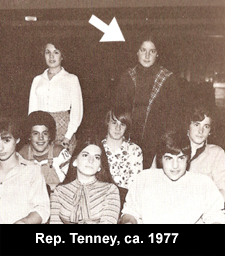When you think about the Kavanaugh nomination, you really need to step back and see the full picture. Sure, stopping the nomination is crucial, and it’s perhaps fortunate that he planted the seeds of his own self-destruction decades ago, long before his tenure as a hyperpolitical operative in the Republican Party. (Honestly, the guy is like the Zelig of American conservatism, working on the Star investigation, researching Vince Foster, participating in the “Brooks Brothers Riot” during the Florida recount, and on from there.) But if his nomination fails, they will attempt to fill the slot quite quickly with a much more boring, just as reactionary judge capable of serving multiple decades on the Supreme Court. So … why not just withdraw this troubled judge?
 My guess is that they’re clinging to this one because Kavanaugh has proven to be such a reliable operative, and because he has a freakishly expansive view of executive power and privilege. (He apparently developed that during his stints in the W. Bush administration.) It’s hard to be certain of their reasoning, but their overarching motivations are quite clear. They want this seat and they want it now. The GOP has been working on this project for decades, taking an already conservative court steadily to the right since Nixon’s days in power. A solid reactionary majority is the right’s insurance policy; it’s their trump card, no pun intended.
My guess is that they’re clinging to this one because Kavanaugh has proven to be such a reliable operative, and because he has a freakishly expansive view of executive power and privilege. (He apparently developed that during his stints in the W. Bush administration.) It’s hard to be certain of their reasoning, but their overarching motivations are quite clear. They want this seat and they want it now. The GOP has been working on this project for decades, taking an already conservative court steadily to the right since Nixon’s days in power. A solid reactionary majority is the right’s insurance policy; it’s their trump card, no pun intended.
Consider the Republican party’s position. They remain, in essence, the party of white men. As this becomes less and less a nation of white men, it is an imperative for them to stave off the inevitable erosion of their voter base. The Senate is not so much of a problem, as a distinctly regional party can dominate that body given that party’s geographic distribution (e.g. Wyoming’s Senate delegation is equal to California’s, even though the latter state is 70 times the size of the former in terms of population). The hyper-partisan GOP gerrymandering of the House in 2010 has made that body a lot more like the Senate in terms of representation, but that is a short-term solution for them. And the Presidency? They have lost the popular vote in six out of the last seven elections, so they mostly rely on narrow electoral college victories.
The Supreme Court, on the other hand, is the ultimate arbiter of public policy. With a solid reactionary majority, the GOP will be able to defeat progressive policies long after the party can no longer dominate electoral politics. So there’s much at stake in the coming days for those eleven angry white men on the Judiciary Committee …. much more than the problematic optics of the Kavanaugh hearing.
Elections matter, people. We need to take the Court seriously.
luv u,
jp

 Super Storm. Hurricane Florence is bearing down on the east coast of the U.S., and is his wont, the President’s first comments centered on, well, himself and the amazing job he did when Hurricane Maria battered Puerto Rico last year. He is flatly denying the veracity of the revised casualty figures that put the death toll from Maria above that of Katrina, saying that the higher numbers were made up by Democrats to make him look bad. I’m betting George W. Bush looks at this with envy and wonders why he never thought of just totally and persistently making shit up about New Orleans.
Super Storm. Hurricane Florence is bearing down on the east coast of the U.S., and is his wont, the President’s first comments centered on, well, himself and the amazing job he did when Hurricane Maria battered Puerto Rico last year. He is flatly denying the veracity of the revised casualty figures that put the death toll from Maria above that of Katrina, saying that the higher numbers were made up by Democrats to make him look bad. I’m betting George W. Bush looks at this with envy and wonders why he never thought of just totally and persistently making shit up about New Orleans. Trump attended a fundraiser for Tenney that was supposed to be a closed-door, no-press event, but at some point they allowed pool reporters in to record his remarks, which were about typical. It amounts to the Democrats wanting to raise your taxes, open the borders wide, and take away your guns. Of course, the president was talking to a crowd of heavy-wallet donors: the cheap seats were $1,000 and sponsors paid $15,000. So, for once, he may be right about Democrats wanting to raise the taxes of the people in that room – they richly deserve it.
Trump attended a fundraiser for Tenney that was supposed to be a closed-door, no-press event, but at some point they allowed pool reporters in to record his remarks, which were about typical. It amounts to the Democrats wanting to raise your taxes, open the borders wide, and take away your guns. Of course, the president was talking to a crowd of heavy-wallet donors: the cheap seats were $1,000 and sponsors paid $15,000. So, for once, he may be right about Democrats wanting to raise the taxes of the people in that room – they richly deserve it. Trump’s fundraiser for Tenney, reportedly, will be private, not open to the public, no lying media allowed. Like most politicians (Tenney included), he prefers a controlled crowd of sycophants to any even nominally open forum. At Fort Drum, however, Trump will be howling and baying his praise of Tenney, Stephanik, and others for co-sponsoring another crap piece of legislation that will pour more money into the base and build a fence around the former installation known as Griffiss, which still houses a raft of military contractors mostly working on high tech. (So, in effect, it’s still an air base, with a landing strip that can accommodate pretty much any military aircraft up to and including the C-5 transport.)
Trump’s fundraiser for Tenney, reportedly, will be private, not open to the public, no lying media allowed. Like most politicians (Tenney included), he prefers a controlled crowd of sycophants to any even nominally open forum. At Fort Drum, however, Trump will be howling and baying his praise of Tenney, Stephanik, and others for co-sponsoring another crap piece of legislation that will pour more money into the base and build a fence around the former installation known as Griffiss, which still houses a raft of military contractors mostly working on high tech. (So, in effect, it’s still an air base, with a landing strip that can accommodate pretty much any military aircraft up to and including the C-5 transport.) They have been busy as hell, too. Just this week, the unbelievably clueless energy secretary Rick Perry (about whose idiocy we did an entire album a few years back) was tooling around upstate New York, stopping at the aging Fitzpatrick nuclear power plant, not so very far from where I’m sitting now. Perry, who originally thought the Energy Department was some kind of lobbying job (!), spouted off about how essential nuclear power is and that investing in it is a “national security” issue. He told our dimwitted local media that the only two types of power sources that are “uninterruptible” (i.e. less vulnerable to attack) are nuclear and coal. This being New York, he probably had to duck while saying it to avoid being hit in the head by a wind turbine … which is more “uninterruptible” than either of his examples. Then there’s solar. (Like I said …. idiot.)
They have been busy as hell, too. Just this week, the unbelievably clueless energy secretary Rick Perry (about whose idiocy we did an entire album a few years back) was tooling around upstate New York, stopping at the aging Fitzpatrick nuclear power plant, not so very far from where I’m sitting now. Perry, who originally thought the Energy Department was some kind of lobbying job (!), spouted off about how essential nuclear power is and that investing in it is a “national security” issue. He told our dimwitted local media that the only two types of power sources that are “uninterruptible” (i.e. less vulnerable to attack) are nuclear and coal. This being New York, he probably had to duck while saying it to avoid being hit in the head by a wind turbine … which is more “uninterruptible” than either of his examples. Then there’s solar. (Like I said …. idiot.) Of course, this principle gets violated all the time without consequence, particularly by our own leaders and those of our allied nations. Not sure how, exactly, this prohibition made its way into this document back in the day when the United States was the sole remaining power and the first-ever superpower in world history. We had an enormous hand in erecting this international order, putting ourselves at the very top of the global power structure in as much as we were the only nation to have emerged from the ravages of World War II stronger than before. Why would we include this principle only to violate it consistently for the next seventy years?
Of course, this principle gets violated all the time without consequence, particularly by our own leaders and those of our allied nations. Not sure how, exactly, this prohibition made its way into this document back in the day when the United States was the sole remaining power and the first-ever superpower in world history. We had an enormous hand in erecting this international order, putting ourselves at the very top of the global power structure in as much as we were the only nation to have emerged from the ravages of World War II stronger than before. Why would we include this principle only to violate it consistently for the next seventy years? That said, the coverage of this series of incidents has been so over the top it’s almost dizzying. Mainstream center-left commentary has portrayed this performance as evidence of treason, selling out the country, proof that Donald Trump is a mere puppet of the nefarious Vladimir Putin. It’s a circumstance in which everyone from war hawks like John McCain to drone apologist John Brennan to Rachel Maddow is in full agreement: Trump should have been tougher on the Russians. He should have never held this summit. Our country was “attacked” by Russia. Their interference in our election was “an attack on American Democracy” of a magnitude similar to Pearl Harbor and 9/11. How many died in the battle of Election 2016? Ask these folks.
That said, the coverage of this series of incidents has been so over the top it’s almost dizzying. Mainstream center-left commentary has portrayed this performance as evidence of treason, selling out the country, proof that Donald Trump is a mere puppet of the nefarious Vladimir Putin. It’s a circumstance in which everyone from war hawks like John McCain to drone apologist John Brennan to Rachel Maddow is in full agreement: Trump should have been tougher on the Russians. He should have never held this summit. Our country was “attacked” by Russia. Their interference in our election was “an attack on American Democracy” of a magnitude similar to Pearl Harbor and 9/11. How many died in the battle of Election 2016? Ask these folks. What emerges is the same bipartisan consensus that has driven bad foreign policy decisions through administrations of both parties for as long as I’ve been alive (and, in truth, longer). It feels to me very much like the assholes vs. the fuckers, and while I certainly don’t want the fuckers running everything, it’s hard to support the assholes and maintain my self-respect. Now, before someone accuses me of Jimmy Dore-like animus toward strategic voting (note: I always vote strategically, specifically to avert the avoidable and wholly predictable disaster that’s unfolding right now), I do have a slight preference for the assholes. But what we need is a radically new approach to national security and international relations – one that would make all of those pundits shake their heads.
What emerges is the same bipartisan consensus that has driven bad foreign policy decisions through administrations of both parties for as long as I’ve been alive (and, in truth, longer). It feels to me very much like the assholes vs. the fuckers, and while I certainly don’t want the fuckers running everything, it’s hard to support the assholes and maintain my self-respect. Now, before someone accuses me of Jimmy Dore-like animus toward strategic voting (note: I always vote strategically, specifically to avert the avoidable and wholly predictable disaster that’s unfolding right now), I do have a slight preference for the assholes. But what we need is a radically new approach to national security and international relations – one that would make all of those pundits shake their heads. This fact is about to be brought home to us all in a far more profound way: Justice Kennedy has announced that he will retire at the end of next month, and I have no doubt that Trump and McConnell will ram a nominee through the confirmation process faster than anyone can imagine. That will lock in a 5-4 reactionary majority on the Court that will be with us for a generation, reversing Roe v. Wade, detonating the remnants of the Voting Rights Act, and generally demonstrating that the Court cannot be relied upon to serve as a bulwark against aggressive extremism. I was never a big fan of Kennedy. Sure, he was the fifth vote on some crucial cases affecting LGBTQ rights and so on, but he is a stingy old stick who apparently isn’t even giving a second thought to allowing this unstable president to choose his successor.
This fact is about to be brought home to us all in a far more profound way: Justice Kennedy has announced that he will retire at the end of next month, and I have no doubt that Trump and McConnell will ram a nominee through the confirmation process faster than anyone can imagine. That will lock in a 5-4 reactionary majority on the Court that will be with us for a generation, reversing Roe v. Wade, detonating the remnants of the Voting Rights Act, and generally demonstrating that the Court cannot be relied upon to serve as a bulwark against aggressive extremism. I was never a big fan of Kennedy. Sure, he was the fifth vote on some crucial cases affecting LGBTQ rights and so on, but he is a stingy old stick who apparently isn’t even giving a second thought to allowing this unstable president to choose his successor. As reported by Chris Hayes and commented on by the folks at
As reported by Chris Hayes and commented on by the folks at